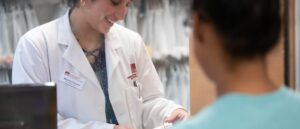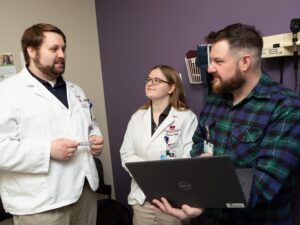Experiential Education
The experiential pharmacy education program enables you to translate your classroom learning into practical experiences in actual pharmacy practice environments.
Gain Real World Pharmacy Experience
The experiential education component of the Doctor of Pharmacy (PharmD) program allows you to step out of the classroom and academic laboratory into a variety of real-world practice settings, putting the knowledge you have gained to use in hands-on pharmacy practice experiences in multiple environments, including inpatient, outpatient, research and industry. These experiences, also known as rotations, make up 30% of the pharmacy curriculum.
The College has practice experiences at more than 500+ pharmacy and clinical sites, including community pharmacies, hospitals, ambulatory-care clinics, research laboratories, managed-care facilities, specialty pharmacies, academia, government agencies and the pharmaceutical industry. These experiences not only expand your knowledge of pharmacy, but often lead to future professional opportunities.
Introductory Pharmacy Practice Experiences (IPPEs)
IPPEs, for pharmacy students in their first three years of the PharmD program, total 320 hours of hands-on practice. All IPPE requirements must be met before beginning Advanced Pharmacy Practice Experiences (APPEs) and must be completed in the United States or its territories in accordance with ACPE Standard 13.8.
Community Pharmacy
- Goal: Expose students to community pharmacy operations
- Duration: 4 weeks (160 hours)
- Timing: Summer after P1 year
- Activities: Dispensing, non-sterile compounding, counseling, administering vaccines, promoting self-care, health and wellness
Institutional Pharmacy
- Goal: Expose students to hospital pharmacy operations
- Duration: 3 weeks (120 hours)
- Timing: Summer after P2 year
- Activities: Unit dose dispensing, sterile compounding, medication reconciliation, provider education
Team-Based Care
- Goal: Expose students to ambulatory patient care
- Duration: 1 week (40 hours)
- Timing: Summer after P2 year
- Activities: Patient interviews, medication histories, patient and provider education
Advanced Pharmacy Practice Experiences (APPEs)
APPEs provide hands-on training that builds on academic knowledge from the PharmD program. Starting in May of the final professional year (P4), you complete seven APPE rotations (five core and two electives), each lasting six weeks, for a total of 42 weeks (42 credits).
Core APPEs include:
- Ambulatory Care: outpatient clinic-based care
- Community: independent, chain, grocery
- Inpatient: hospitalized patients and nursing
- Institutional: hospital pharmacy
You must complete four core rotations in the United States, in each area of community pharmacy, ambulatory care, inpatient care, and institutional pharmacy. Ambulatory-care, inpatient and community rotations involve direct contact with patients.
Flex Core allows you to select an area of interest: Ambulatory Care, Community or Inpatient.
Elective APPEs comprise two rotations for the program, each lasting six weeks and worth six academic credits. They may include compounding, medication safety, military pharmacy and more. These can be completed within the United States or internationally.
International rotations offer opportunities to gain credits while working with professionals abroad. They expand your knowledge and provide a global health-care perspective, including insights into traditional medicine and cultural experiences. Recent locations include Italy, Japan, China, South Korea and Canada. More details will be shared during APPE orientation in the P3 year.

PharmD candidates will need to complete the following documentation annually prior to starting rotations. Clinical Lab Sciences and Cytotechnology students will only need to complete the documentation once prior to starting rotations. The dates must be adhered to in order to ensure the documentation remains in effect through the duration of the ensuing rotation year (TB screening and physical exam information must be current within one calendar year of the rotation end date.)
Rotation sites hosting experiential rotations may deny a student’s participation in the program because of the inability to produce an appropriate health clearance, which could result in delayed graduation or in the inability to graduate from the program.
Physical Exam: An annual physical exam, valid for a 12 month period, is required.
Tuberculosis (TB) Infection Screening (Tuberculin Skin Test [TST]/Mantoux or Quantiferon Blood Test/IGRA):
- If your TB screening result is positive, you must receive a chest x-ray and provide the College with documentation of both the screening results and the x-ray report, as well as any follow-up treatment you receive.
- If you have had a positive TB screening in the past, you need to provide a copy of those results, along with a copy of a negative chest x-ray report, and any follow-up treatment you received.
- Those excluded from TB screening due to prior positive reaction or past disease must be evaluated during their annual physical exam for active signs of the disease. A Quantiferon blood test is recommended for those PPD+.
Seasonal Influenza Vaccination:
A seasonal flu vaccination is required annually in the Fall (vaccinations are typically available starting in August each season).
Some rotation sites have additional requirements that must be completed prior to starting that specific rotation (e.g. antibody titer as opposed to proof of vaccination; drug screen; background check). These additional requirements are communicated to the student in advance of the rotation by Experiential Education staff.
It is the student’s responsibility to ensure the requirements are met prior to commencement of the rotation. If they are not met prior to start of their experience, the student will not be allowed to begin the rotation until they have been fulfilled. Failure to provide sufficient documentation prior to rotations puts a student at risk for being removed from rotation. If a student is removed for this reason, he/she may be rescheduled for a later rotation and placed at any available rotation site (not necessarily the choice of the student).
Prior to any rotation, students must register as a pharmacy intern in the state where the rotation will be performed, if applicable.
Prior to APPEs, students must have successfully completed their IPPE requirements.
Special Site Requirements
HIPAA, Bloodborne Pathogens and Info Security Trainings
Students participating in experiential education leading to a career as a pharmacist must complete a Health Privacy (HIPAA), an OSHA Bloodborne Pathogens and an Info Security training during their P1 year, and annually thereafter. Students will complete the online trainings through The Collaborative Institutional Training Initiative (CITI Program), and is provided free of charge to students. If a student does not complete one of the above requirements initially, they will not receive their assignments for IPPE rotations; in successive years, if the trainings are not completed by the deadline set, students will not be allowed to start their rotations.
CPR or Basic Life Support Certification
All pharmacy students are required to obtain CPR (Cardiopulmonary Resuscitation) or BLS (Basic Life Support) certification before starting clinical rotations.
Students must have valid CPR or BLS certification before they begin their IPPE rotations and will be required to keep their certification valid throughout the duration of their APPE rotations.. All certifications must include a hands-on skills portion (training cannot be completed online only.)
Individuals who have been convicted of a felony or misdemeanor may be denied certification or licensure as a health professional. Information regarding eligibility for licensing in a particular jurisdiction may be obtained from the appropriate credentialing body of that jurisdiction.
Rotation sites may deny a student’s participation in the experiential program because of a felony or misdemeanor conviction, failure of a required drug test, or inability to produce an appropriate health clearance, which would result in delayed graduation or in the inability to graduate from the program.
Because institutions hosting experiential education may require a criminal background check to permit students to their facility, the College will conduct background checks on all students entering experiential programs, using the Health and Human Services/Office of Inspector General (HHS OIG) database.
The goal of the HHS OIG background check website is to identify individuals and businesses excluded from federally funded health care programs. This includes individuals convicted of fraud related to federal programs, patient abuse, licensing board actions and default on health education assistance loans.
If a student is identified via the use of this database, the matter is referred to a committee appointed by the Department of Pharmacy Practice for action.
ACPHS uses CORE ELMS as its online rotation management system for pharmacy practice experiences.
New Preceptors
If you would like to become a preceptor, please create a preceptor profile in CORE ELMS and use code: ACPHSPRECEPTOR.
Existing Preceptors
If you’re currently serving, thank you for helping educate the next generation of pharmacists. To reach CORE ELMS, please go to CORE ELMS login. If you have forgotten your password or need assistance with basic CORE ELMS functions, please review the four minute CORE ELMS How-To Video or contact the Experiential Education team.
“There were no other colleges that I had been looking at, that had opportunities for international travel. Talking to other pharmacy students from other colleges and preceptors outside of ACPHS, they were always shocked that I had this opportunity.
2024 Preceptor of the Year
Dr. Michael Zappone, assistant professor at ACPHS, was named Faculty Preceptor of the Year for his exceptional mentorship. He emphasizes a holistic view of student growth, integrating academic progress with personal goals. Students find him "caring," "down to earth" and adaptable. Dr. Zappone encourages taking appropriate risks and learning from mistakes in a supportive environment, reflecting his dedication to student success and patient care.
Meet Our Team
Jennifer Cerulli, PharmD, RPh
Director
Emilee Bonnier, PharmD, RPh
Assistant Director
Diana Foster
Experiential Affiliation and Compliance Specialist
Megan Veselov, PharmD, RPh, MBA
Coordinator
Debbie Reutter
Office Coordinator


Social